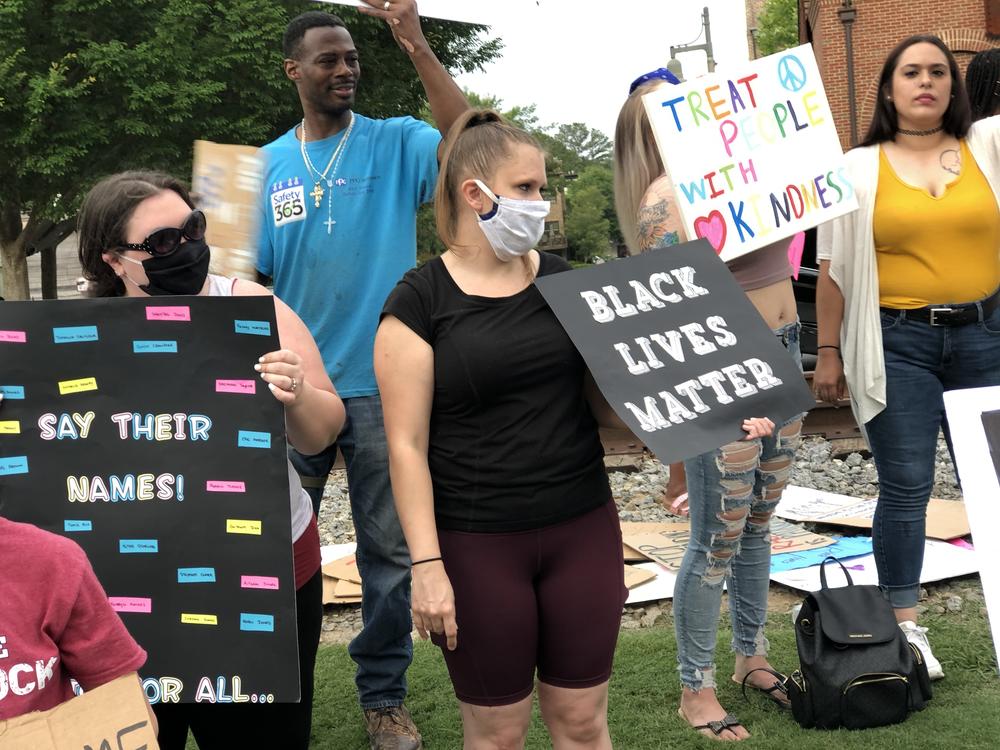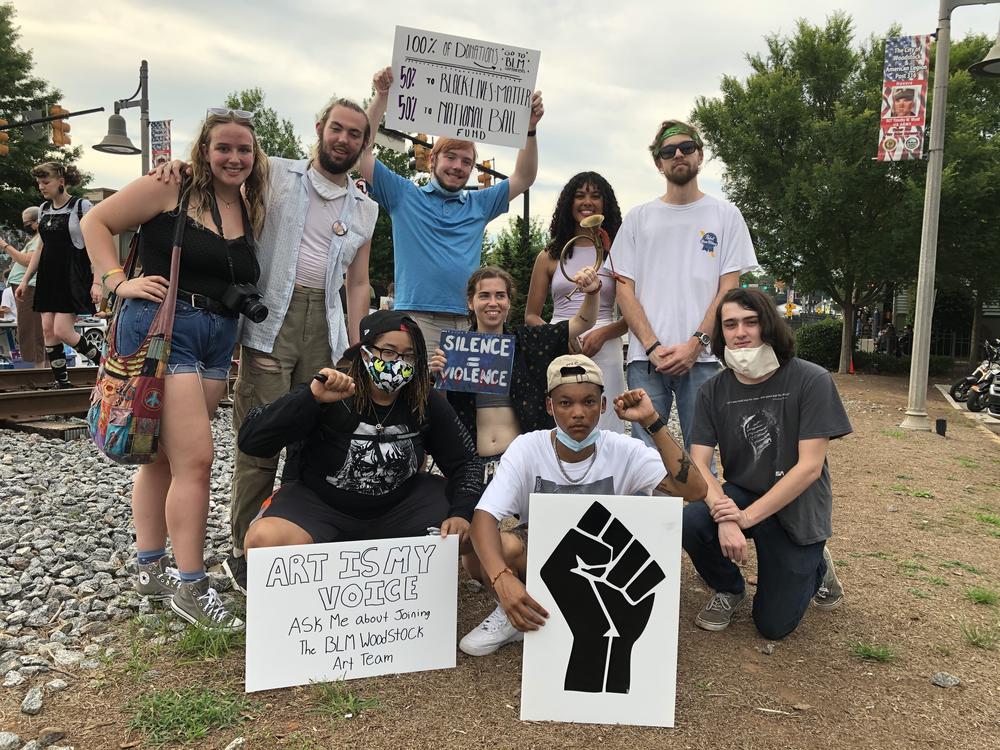Section Branding
Header Content
Examining The Role Of The White Voice In The Black Lives Matter Movement
Primary Content
A diverse chorus of voices calling for justice and an end to police brutality continues in many cities across the nation. The protests follow the death of George Floyd, a black man killed by a white Minneapolis police officer.
And in some places, these protests are being led by white people. That has many asking just what role, if any, do white people have in the Black Lives Matter movement.GPB's Ellen Eldridge reports on the role of the white voice in the Black Lives Matter movement.
Almost every night in downtown Woodstock for the past two weeks people waved signs saying things like “Black Lives Matter” and “I can’t breathe.”
It’s the result of a Facebook group started June 1 that already has more than 1,100 members.
Ryan McCall, a white 23-year-old Kennesaw State University student, started the Facebook group called Black Lives Matter Woodstock.
"I've been kind of looking for a place to start activism in Woodstock for a while," he said. "I have a lot of heart in this issue in particular because I'm actually descended from Stonewall Jackson. And so I wanted to, like, provide a medium for people to speak out on injustices."
It comes as little surprise that McCall’s group is mostly white. More than 78% of Woodstock’s residents are white, and about 72% of voters cast ballots for Donald Trump in the 2016 election.
Still, McCall is sensitive to two conflicting messages: that white people should not be silent but also they should “shut up and listen.”
Gerald Griffith, a black man who lives in Woodstock with his wife and children, isn’t a member of the Black Lives Matter Woodstock Facebook group, but he said he doesn’t have a problem with white voices speaking up.
He brought people together with a town talk in the park last weekend.
He said the people he knows in the community are from his kids' schools and business affiliations, so he wanted to open a dialogue with white people who told him they didn't know how to approach conversations about race.
"They asked me because they knew me from these meetings and we were familiar with each other, so they felt comfortable enough to ask the questions," Griffith said.
To help others understand some of the underlying anger, resentment and frustration that comes from years of systemic racism, Griffith shared the account of an African American child who was unfairly convicted of murdering two white girls, ages 7 and 11, in his hometown of Alcolu, South Carolina. George Junius Stinney, Jr. was executed by electric chair in June 1944.
"He was pulled out of his home and given a two-hour trial," Griffith said. "Ten minutes later, they convicted him to die."
The 14-year-old boy was taken 80 miles from his home, held in solitary confinement for 81 days and then executed, Griffith shared. Stinney is the youngest person to ever be executed in U.S. history.
Griffith said he chose to engage in conversation about race relations while others protested with signs and chants on the corner across from the park.
“You make a difference in those small, little incremental ways where you work within your own sphere of influence to change the conversation, to change the thought process of the people around you and, where necessary, to take a stand," Griffith said.
The Black Lives Matter Woodstock Facebook group wants more diverse representation. That includes putting more people of color in leadership. People like Grace St. George, who is a biracial administrator of the group.
She said she’s grateful for the movement in cities like Atlanta, but it isn't enough.
"You've got to move out and let everyone here know that this isn't just in the city," St. George said. "This isn't far away from home. This is happening in their hometowns. This is in our backyard."
Though Georgia doesn’t have an official Black Lives Matter chapter, St. George’s group of predominantly white people is using that name on Facebook, which doesn’t sit right with Deedra Climer.
Climer, a white woman with black children and grandchildren, questions the choice of name.
"The primary issue is the appropriation of the name Black Lives Matter and the appropriation of the physical and emotional labor that people did to get that name recognition," Climer said. "When I asked that, I was told, 'Yeah, but that name ... that's what's getting people here is that name.' And I'm like, oh, that's starting to get really yucky, right."
Climer said she tried to encourage the group to change its name so that it wasn’t appropriating the Black Lives Matter name, but instead St. George deleted her post and then blocked Climer from the group.
She said she respects the white members of the group for taking up the cause, but it’s a fine line between joining a movement and taking it over.
As for the role of white voices in a black movement, Climer said it's whatever black people say it is.
"Not just for the Black Lives Matter movement, but for social justice and anti-racism in general, our role is whatever they tell us it needs to be at that moment," Climer said. "It sucks that people we oppress have to teach us about how we're oppressing them. But after hundreds of years, we seem to not have been able to figure that out, myself included."





